
 On 21 October 2015, decisions were taken regarding the latest round of the South Asia Student Association (SASA) Travel Grants for Lund University students. For the Spring semester 2016, SASA awarded travel grants to three Lund University students in order to undertake a field study in relation to a thesis in any of the eight South Asian countries. One of them has however decided to do fieldwork outside South Asia, so two successful candidates remain:
On 21 October 2015, decisions were taken regarding the latest round of the South Asia Student Association (SASA) Travel Grants for Lund University students. For the Spring semester 2016, SASA awarded travel grants to three Lund University students in order to undertake a field study in relation to a thesis in any of the eight South Asian countries. One of them has however decided to do fieldwork outside South Asia, so two successful candidates remain:


• Otso Harju, Masters student in Asian Studies at the Centre for East and South-East Asian Studies, with an application dealing with female domestic servants employed by middle class, young unmarried metropolitan women in India.
• Sanchari De, PhD student at the Department of Communication and Media, regarding a project on the connection on social media and social movements against the backdrop of the Shahbag movement in Bangladesh.
The application round was open during September and early October 2015 for students enrolled at Lund university at fulltime study programmes, preferrebly including a South Asia focus. The purpose of the travel grants is to give the students the opportunity to visit South Asian countries to carry out their field work and directly engage with local actors to achieve more objective and thorough results. The funding comes from SASNET, that also provides the students assistance with connections and resources needed to complete high quality field work.
Well-attended SASA/SASNET Fika without borders seminar on Afghanistan

 On Thursday 26 November 2015, the South Asian Student Association (SASA) organised its final 2015 edition of its informal Fika Without Borders South Asia series. This time the country in focus was Afghanistan. At the wel-attended event, organized in collaboration with SASNET, Anders Fänge, one of Sweden’s foremost experts on Afghanistan, gave a talk entitled Afghanistan’s Classical Problem – A Functioning State, about Afghanistan’s history focusing on the problems which have been faced by different Afghan governments which have tried to build a state. See the poster.
On Thursday 26 November 2015, the South Asian Student Association (SASA) organised its final 2015 edition of its informal Fika Without Borders South Asia series. This time the country in focus was Afghanistan. At the wel-attended event, organized in collaboration with SASNET, Anders Fänge, one of Sweden’s foremost experts on Afghanistan, gave a talk entitled Afghanistan’s Classical Problem – A Functioning State, about Afghanistan’s history focusing on the problems which have been faced by different Afghan governments which have tried to build a state. See the poster.
It is the absence of a functioning state that is one of the main causes that the country has been affected by unrest and war during long periods since the founding of the nation 1747, and it rermains so even today. Since 2001, after the collapse of the Taliban regime and the establishment of the Karzai government, Afghanistan has received billions of dollars aimed at assisting the country in military affairs, development and state building, but plans and ambitions have not been fulfilled. The Taliban insurgency is growing stronger, the new government has obvious difficulties in getting its act togehter, neighbouring states are interfering, and international military and devlopment assistance are waning.

 Anders Fänge worked a manager of the Swedish Committee for Afghanistanand has been a pioneer in developing its projects in agriculture, health care, and education. In addition he has been a driving force behind the functional nationwide school system in Afghanistan today. He has also been engaged in securing education for girls and women. In addition to Afghanistan, he has also worked over the past 30 years in Ethiopia for Save the Children, in Central Asia for the Red Cross, and in Somalia and the West Bank for the UN. He holds an honorary doctorate from Umeå University. Besides, Anders is a member of SASNET’s board.
Anders Fänge worked a manager of the Swedish Committee for Afghanistanand has been a pioneer in developing its projects in agriculture, health care, and education. In addition he has been a driving force behind the functional nationwide school system in Afghanistan today. He has also been engaged in securing education for girls and women. In addition to Afghanistan, he has also worked over the past 30 years in Ethiopia for Save the Children, in Central Asia for the Red Cross, and in Somalia and the West Bank for the UN. He holds an honorary doctorate from Umeå University. Besides, Anders is a member of SASNET’s board.
After the lecture, Afghani home-made snacks were served. The delicious food items has been prepared by SASA board members anda couple of Afghani friends the night before in the kitchen of SASNET deputy director Lars Eklund and his wife Bubu (photo).
Venue: Basement International Relations Desk, Lund University, Stora Algatan 4, Lund.
Lund Seminar on Resistance against Rape Culture and Sexism in Globalizing India


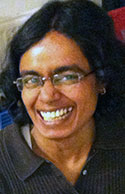 SASA, the South Asian Students Association, in collaboration with SASNET, organized a highly interesting seminar on “Rape culture and sexism in globalizing India” with Dr. Radhika Krishnan on the 5th of November 2015 at 17.00 at the External Relations Desk at Lund University, Stora Algatan 4, Lund. See the poster.
SASA, the South Asian Students Association, in collaboration with SASNET, organized a highly interesting seminar on “Rape culture and sexism in globalizing India” with Dr. Radhika Krishnan on the 5th of November 2015 at 17.00 at the External Relations Desk at Lund University, Stora Algatan 4, Lund. See the poster.
The seminar was as usual recorded by Talat Bhat and is now available on Youtube.
 The lecture took its starting point in the horrific and gruesome gang-rape of a 23 year-old woman in Delhi in December 2012, which was followed by massive protests in different parts of India. A vivid discussion folllowed her presentation, with inputs by both students and faculty in the audience.
The lecture took its starting point in the horrific and gruesome gang-rape of a 23 year-old woman in Delhi in December 2012, which was followed by massive protests in different parts of India. A vivid discussion folllowed her presentation, with inputs by both students and faculty in the audience.
Dr. Krishnan is currently guest researcher at Linnaeus University in Växjö/Kalmar where she is connected to the Centre for Concurrences in Colonial and Postcolonial Studies during the entire 2015. She has a PhD from the Centre for Studies in Science Policy at Jawaharlal Nehru University (JNU) in New Delhi. Her doctoral research attempted to explore the trade unionist Shankar Guha Niyogi’s varied reflections and interventions under the broad rubrics of environment, development and technology. An electrical engineer by training, Radhika has worked with the Delhi-based Centre for Science and Environment (CSE) for several years. Her research has essentially looked at the interactions between technological regimes, communities and local ecologies. Her research interests also include the new social movements of the 1970s and 1980s, which articulated the complex response of peasants, labourers and adivasis (India’s indigenous people) to the ‘development’ project presented to them. Full abstract.
SASNET workshop on future media landscape in Sweden and India


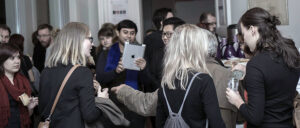 On 19–20 October 2015, SASNET held its first explorative workshop within its Sweden–South Asia Media Project. It was held in Lund, and the focus for this first workshop was India. It will be followed by a mirror workshop in Delhi in December. The aim is to highlight the future media landscapes in India and Sweden. The two-day workshop in Lund brought up questions related to the following topics: • Working Condition of Journalists; • Political Influence on Media; • Online Ethics; • Gender in Media; and • Innovation in Media. Indian media researchers and journalists presented their experiences and outlooks on the future media landscape during panel talks, presentations and seminars. Among the participants should be mentioned Vibodh Parthasarathi, media researcher from the Centre for Culture, Media & Governance, Jamia Millia Islamia University in New Delhi; Professor Anjali Monteiro and Professor K P Jayasankar from Tata Institute of Social Science (TISS) in Mumbai; Dr. Devika Jayakumari from Centre for Development Studies (CDS) in Thiruvanantapuram; and Divya Rajagopal, Financial reporter at Economic Times newspaper in Mumbai.
On 19–20 October 2015, SASNET held its first explorative workshop within its Sweden–South Asia Media Project. It was held in Lund, and the focus for this first workshop was India. It will be followed by a mirror workshop in Delhi in December. The aim is to highlight the future media landscapes in India and Sweden. The two-day workshop in Lund brought up questions related to the following topics: • Working Condition of Journalists; • Political Influence on Media; • Online Ethics; • Gender in Media; and • Innovation in Media. Indian media researchers and journalists presented their experiences and outlooks on the future media landscape during panel talks, presentations and seminars. Among the participants should be mentioned Vibodh Parthasarathi, media researcher from the Centre for Culture, Media & Governance, Jamia Millia Islamia University in New Delhi; Professor Anjali Monteiro and Professor K P Jayasankar from Tata Institute of Social Science (TISS) in Mumbai; Dr. Devika Jayakumari from Centre for Development Studies (CDS) in Thiruvanantapuram; and Divya Rajagopal, Financial reporter at Economic Times newspaper in Mumbai.
Hindol Sengupta, Editor-at-Large for Fortune India, being one of the key persons involved in planning for the Sweden-South Asia Media Project from the beginning, took part in a highly interesting panel discussion on What are our Future Challenges for Journalism in Sweden and india? along with Heidi Avellan, Political Editor in Chief at regional newspapers Sydsvenskan and Helsingborgs Dagblad; and in another highly relevant panel discussion, Priyanka Borpujari – independent reporter based in both Mumbai and Guwahati – talked about Journalists’ Working Conditions in Sweden and India together with Jonas Nordling, President of the Swedish Union of Journalists (SJF). Read more about the workshop…
See photos from first day on SASNET’s Facebook page.
Success for SASA/SASNET Fika without borders Bangladesh seminar

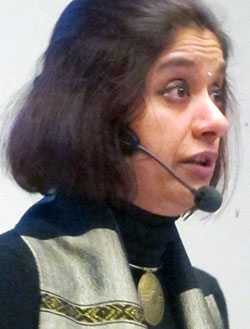 The South Asian Student Association (SASA) organised its eighth informal Fika Without Borders South Asia event in collaboration with SASNET on Thursday 22 October 2015 from 17.00-19.00 focusing on Bangladeshi food and music. It was a grand success. More than 70 people came to attend.
The South Asian Student Association (SASA) organised its eighth informal Fika Without Borders South Asia event in collaboration with SASNET on Thursday 22 October 2015 from 17.00-19.00 focusing on Bangladeshi food and music. It was a grand success. More than 70 people came to attend.
The main presentation for this edition was given by Manpreet Janeja, assistant professor at the Department of Cross-Cultural and Regional Studies at the University of Copenhagen. She discussed how food plays a prominent role in variegated trajectories of imagining Bangladesh. Food figures in visual art, music, religious rituals, as well as literary tropes, development discourses, and the political economy of hunger. The talk focused on the aesthetics of normal food in imagining Bangladesh.

 Drawing on ethnographic fieldwork, it examined the practices of everyday cooking and eating ‘normal Bengali meals’ in middle-class households in the city of Dhaka that employ cooks from poor classes, also drawn from other parts of Bangladesh. In so doing, it illuminates the dynamic character of the aesthetics of food as integral to forms of belonging and domesticity.
Drawing on ethnographic fieldwork, it examined the practices of everyday cooking and eating ‘normal Bengali meals’ in middle-class households in the city of Dhaka that employ cooks from poor classes, also drawn from other parts of Bangladesh. In so doing, it illuminates the dynamic character of the aesthetics of food as integral to forms of belonging and domesticity.
This way the presentation invited the audience to approach the form that a meal acquires as a window on the flux of everyday life in the South Asian city. After the presentation there was delicious Bengali food served – food being prepared by the SASA board members assisted by Bubu Eklund and Jacco Visser.
 The programme ended with a music performance by Lund Baul’s, a music group interpreting Bangladeshi Baul music (photo below). The event was held at Kårhusets Hörsal, LTH, John Ericssons väg 3, Lund. This semester’s SASA/SASNET Fika Without Borders series started with a well attended event on the Maldives on the 1st of October. On the 26th of November 2015 the next edition will take place focusing on Afghanistan.
The programme ended with a music performance by Lund Baul’s, a music group interpreting Bangladeshi Baul music (photo below). The event was held at Kårhusets Hörsal, LTH, John Ericssons väg 3, Lund. This semester’s SASA/SASNET Fika Without Borders series started with a well attended event on the Maldives on the 1st of October. On the 26th of November 2015 the next edition will take place focusing on Afghanistan. 
SASNET seminar on Biofuel Development in India

 PhD candidate Shveta Soam from the DBT-IOC Advanced Bioenergy Research Centre in Faridabad, India, held a public SASNET lecture focusing on biofuel development in India on Friday 23 October 2015. Venue: Lecture hall G, Chemical Centre, Sölvegatan 39, entrance B. See poster.
PhD candidate Shveta Soam from the DBT-IOC Advanced Bioenergy Research Centre in Faridabad, India, held a public SASNET lecture focusing on biofuel development in India on Friday 23 October 2015. Venue: Lecture hall G, Chemical Centre, Sölvegatan 39, entrance B. See poster.
The seminar was recorded by Talat Bhat. See the video recording.
Shveta, basically a botanist and environmentalist, is currently a guest researcher at the Division of Environmental and Energy Systems Studies, Lund University, funded by a SASNET South Asian short-term fellowship (more information). Her presentation was entitled ”Life Cycle Assessment of Biofuels in India and its Impact on Indian Biofuel Programme”, and took its starting point in the decision by the Government of India in 2009 to mandate a 10 p.c. ethanol blending target across 20 states and four union territories, and its proposal to replace fossil based gasoline and diesel by using 20 p.c. biofuels by 2017.
Abstract: India’s biofuel programme relies mainly on the ethanol from molasses. Therefore, quantification of greenhouse gas (GHG) emissions and the energy consumed during the process of ethanol production is desirable to help policy makers to take meaningful decisions. Life Cycle Assessment (LCA) is one such tool to assess environmental aspects associated with a product, process or service. LCA concludes that fuel ethanol produced from sugarcane molasses in India reduces GHG emissions between 60-75 p.c. and gives a higher Net energy ratio of 3.4 – 4.5 when compared to gasoline. With increasing demand of ethanol blending in gasoline, concern is rising to produce ethanol from lignocellulosic waste and rice straw is one such biomass that is available surplus in the fields. Usually farmers burn rice straw in the field to make their fields ready for succeeding crop. But, if utilized for Bioenergy production it can give a significant reduction in GHG emissions. We compared four different scenarios of rice straw utilization practices in India i.e. used as: 1. fertilizer, 2. animal fodder 3. electricity and 4. biogas. Efficient utilization of rice straw could reduce the burden on environment by avoiding burning. Electricity production from rice straw is the preferable practice to reduce GHG emissions followed by biogas production, animal fodder and use as fertilizer. More information about Shveta Soam and her Lund University connection.
SASNET seminar on the Social History of Indian Circus


 On Thursday 22 October 2015, SASNET organized a seminar in Lund on ”The Social History of Circus in India”. The speaker is Dr. P. R. Nisha from the Department of History, University of Delhi, India, holding a short term SASNET fellowship during two months at the Department of Human Geography, Lund University. Venue: Room Johannesburg (430), Geocentrum 1, Sölvegatan 10, Lund. See the poster.
On Thursday 22 October 2015, SASNET organized a seminar in Lund on ”The Social History of Circus in India”. The speaker is Dr. P. R. Nisha from the Department of History, University of Delhi, India, holding a short term SASNET fellowship during two months at the Department of Human Geography, Lund University. Venue: Room Johannesburg (430), Geocentrum 1, Sölvegatan 10, Lund. See the poster.
The seminar was recorded by Talat Bhat. See the video recording.
 In her presentation, Dr. Nisha focused on the Malabar coast region in North Kerala, an area that has been of interest to social scientists principally for the matrilineal system and performative arts and martial forms. Malabar has provided the greater part of artists, trainers, managers and entrepreneurs to Indian circuses during the 20th century. As part of her doctoral thesis, ‘A History of Circus and Circus Performances in Twentieth Century Kerala’, Nisha looked at the various traditions of physical cultures that went into the shaping of circus acrobatics, the recasting of body and its caste and gender structures, new transcultural and transnational spaces that emerged with this itinerant entertainment, technologies of the tent, and the acquisition, taming and training of animals whose past is deeply implicated in the history of hunting, wildlife management and forest policies of the colonial and post-colonial states in India. In short, circus in the sub-continent is embedded with the arrival of the modern and its effects.
In her presentation, Dr. Nisha focused on the Malabar coast region in North Kerala, an area that has been of interest to social scientists principally for the matrilineal system and performative arts and martial forms. Malabar has provided the greater part of artists, trainers, managers and entrepreneurs to Indian circuses during the 20th century. As part of her doctoral thesis, ‘A History of Circus and Circus Performances in Twentieth Century Kerala’, Nisha looked at the various traditions of physical cultures that went into the shaping of circus acrobatics, the recasting of body and its caste and gender structures, new transcultural and transnational spaces that emerged with this itinerant entertainment, technologies of the tent, and the acquisition, taming and training of animals whose past is deeply implicated in the history of hunting, wildlife management and forest policies of the colonial and post-colonial states in India. In short, circus in the sub-continent is embedded with the arrival of the modern and its effects.
Well-attended SASNET seminar on denial of self-determination in Kashmir

 SASNET organised a seminar on “Kashmiris caught in India-Pakistan Conflict: Denial of Self-Determination and Human Rights” on Thursday 8 October 2015. The main speaker was Dr Dibyesh Anand, Associate Professor in International Relations and the Head of the Department of Politics and International Relations at the University of Westminster in London. See the poster.
SASNET organised a seminar on “Kashmiris caught in India-Pakistan Conflict: Denial of Self-Determination and Human Rights” on Thursday 8 October 2015. The main speaker was Dr Dibyesh Anand, Associate Professor in International Relations and the Head of the Department of Politics and International Relations at the University of Westminster in London. See the poster.
 Talat Bhat, film maker based in Lund, was the second participant. His documentary film on Kashmir, ”Bring him back” was screened (more information about the film). The venue for the event It was held at the Centre for Middle Eastern Studies, in its seminar room which was packed with people.
Talat Bhat, film maker based in Lund, was the second participant. His documentary film on Kashmir, ”Bring him back” was screened (more information about the film). The venue for the event It was held at the Centre for Middle Eastern Studies, in its seminar room which was packed with people.
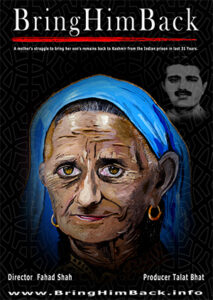 After the movie the main speaker Dibyesh Anand who is the author of monographs “Geopolitical Exotica: Tibet in Western Imagination”, “Tibet: A Victim of Geopolitics”, and “Hindu Nationalism in India and the Politics of Fear”, talked about his current research on colonial practices by China and India, with special reference to Kashmir. In his presentation he focused on the fact that while Kashmir is known primarily as a site of territorial dispute between India and Pakistan, there are conflicting narratives around the dispute.
After the movie the main speaker Dibyesh Anand who is the author of monographs “Geopolitical Exotica: Tibet in Western Imagination”, “Tibet: A Victim of Geopolitics”, and “Hindu Nationalism in India and the Politics of Fear”, talked about his current research on colonial practices by China and India, with special reference to Kashmir. In his presentation he focused on the fact that while Kashmir is known primarily as a site of territorial dispute between India and Pakistan, there are conflicting narratives around the dispute.

The focus was on a Kashmiri narrative and topics related to this such as that a persistent dehumanisation has been the most conspicuous characteristic of the conflict in the region. Practices of dehumanisation allow the existing nation-states to go against the principles of democracy, human rights and self-determination and enable epistemic, cultural, political and corporeal violence on the Kashmiri body politic. Questions that were raised during the seminar were for example: What are the conflicting narratives about Kashmir? Are they permanently irreconcilable? Is the dehumanisation of Kashmiris by India mainly a product of armed insurgency in the Kashmir valley in the 1990s or is it an integral part of Indian rule over Kashmiris? How important is religion as a factor? What forms of dehumanisation and violence have been deployed by the nation-states to control the people?
 The wider context of the geopolitics of the region – including the stated (post)colonial nature of states such as China, India and Pakistan vis-à-vis occupied and oppressed people of Tibet, East Turkestan/Xinjiang, Kashmir and Balochistan – was also a part of the discussion.
The wider context of the geopolitics of the region – including the stated (post)colonial nature of states such as China, India and Pakistan vis-à-vis occupied and oppressed people of Tibet, East Turkestan/Xinjiang, Kashmir and Balochistan – was also a part of the discussion.
The entire seminar was recorded by Talat Bhat, go for his Youtube video.
SASNET seminar on sex selected abortions in India



 Dr. Sabu George from the Centre for Development Studies, New Delhi is one of India’s leading campaigner against female infanticide. He gave a public SASNET lecture at Lund University on Friday 9 October 2015. The seminar, entitled ”Sex selected abortions and infanticide in India” focused on sex selected abortions, and it was organised in collaboration with the Lund based NGO The Swallows India Bangladesh. Venue: Dept. of Political Science, room 021, Paradisgatan 5 H (Eden), Lund. The seminar was as usual being recorded by Talat Bhat and is now available on Youtube. Go for the video.
Dr. Sabu George from the Centre for Development Studies, New Delhi is one of India’s leading campaigner against female infanticide. He gave a public SASNET lecture at Lund University on Friday 9 October 2015. The seminar, entitled ”Sex selected abortions and infanticide in India” focused on sex selected abortions, and it was organised in collaboration with the Lund based NGO The Swallows India Bangladesh. Venue: Dept. of Political Science, room 021, Paradisgatan 5 H (Eden), Lund. The seminar was as usual being recorded by Talat Bhat and is now available on Youtube. Go for the video.
Sabu George talked about his work related to girl child issues such as pre-school child nutrition, female infanticide, girl child neglect, and female foeticide (sex selection). The talk was based on his research on child nutrition which was largely done during 1985 to 1996. Sabu George also talked about female infanticide research in Tamil Nadu, as well as in southern Andhra Pradesh and northern Karnataka. The seminar was based on statistics on sex selection, part of his research in most parts of India up till today. More information.
Big crowd attended Fika without borders seminar focusing on Maldives

 The South Asian Student Association (SASA) at Lund University organised its fifth 2015 Fika without borders seminar, this time focusing on The Maldives, on Thursday 1 October 2015, 17–19, at the usual venue: the basement floor at Lund University External Relations (ER) building, Stora Algatan 4, Lund. The Maldives seminar drew a record crowd of more than 70 people. It consisted of three informal talks about the Maldives; one on climate change risks and tourism, and another on journalistic freedom in the country. See the poster.
The South Asian Student Association (SASA) at Lund University organised its fifth 2015 Fika without borders seminar, this time focusing on The Maldives, on Thursday 1 October 2015, 17–19, at the usual venue: the basement floor at Lund University External Relations (ER) building, Stora Algatan 4, Lund. The Maldives seminar drew a record crowd of more than 70 people. It consisted of three informal talks about the Maldives; one on climate change risks and tourism, and another on journalistic freedom in the country. See the poster.
The first presentation is given by Nils Finn Munch-Petersen (on photo), Senior expert at the Nordic Institute of Asian Studies (NIAS) in Copenhagen, Denmark. He spoke about the Maldives before the advent of tourism, perceptions of climate change, Maldivian Islam and the erosion of journalistic freedoms.

The second presentation was given by Nashfa Hawwa, Maldivian student in the Master’s programme in Environmental Management and Policy at Lund University. She illustrated how tourism on the islands is adopted to increasing climate change risks. She did so based on her own experiences on the island as well as her involvement in the Tourism Adaptation Project (TAP). Tourism is the dominant sector of the Maldivian economy and is linked to many other industries such as agriculture, fisheries and waste management. The talk will engage with the ways in which climate change undermines the resilience and viability of these industries and provides insights into how risks can be minimized by altering day-to-day tourism operations.
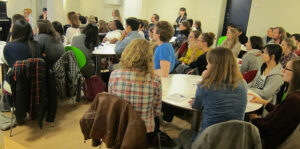 The third presentation was given by Axel Vikström, a student of journalism at Lund University. His talk was based on his experiences in the Maldives for a study project on reporting on the democracy crisis in the Maldives, a decline in human rights, decreasing religious tolerance and disappearing journalists. For his project he received a fieldwork grant from SASA/SASNET.
The third presentation was given by Axel Vikström, a student of journalism at Lund University. His talk was based on his experiences in the Maldives for a study project on reporting on the democracy crisis in the Maldives, a decline in human rights, decreasing religious tolerance and disappearing journalists. For his project he received a fieldwork grant from SASA/SASNET.
In between the talks, coffee, tea and Maldivian tuna fish snacks were served!
Fika Without Borders South Asia events is a project started by SASA, in collaboration with SASNET, in which SASA organises a fika once a month, each time focusing on one of the eight South Asian countries. The 2015 series started with a Nepal fika on 5th February, an India fika on March 19th, a Pakistan fika on May 7th, and a Sri Lanka seminar on May 28th. Upcoming events are a Bangladesh seminar on October 22nd,and an Afghanistan seminar on November 26th.
Health and Safety in the Bangladesh Ready Made Garment industry
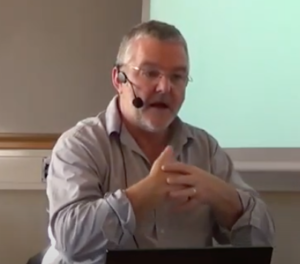
 Seminar with Professor Emeritus Doug Miller from the School of Design at University of Northumbria in Newcastle on Tyne, UK, on Thursday 3 October 2013. The seminar was organised in collaboration with the Dept. of Sociology and the School of Social Work at Lund University. Venue: Edebalksalen, School of Social Work, Bredgatan 13, Lund. See youtube recording.
Seminar with Professor Emeritus Doug Miller from the School of Design at University of Northumbria in Newcastle on Tyne, UK, on Thursday 3 October 2013. The seminar was organised in collaboration with the Dept. of Sociology and the School of Social Work at Lund University. Venue: Edebalksalen, School of Social Work, Bredgatan 13, Lund. See youtube recording.
The textile and clothing industries provide the single most important source of economic growth in Bangladesh’s rapidly developing economy. Today, about 4 million people, mostly women, work in Bangladesh’s export-oriented ready-made garment industry, and exports of textiles and garments are the principal source of foreign exchange earnings. The backside is super-exploitation and repression of the workers who receive minimal wages, and an alarming lack of occupational health and safety due to corruption. Deadly fires and other incidents occur regularly, and the Rana Plaza garment factory complex collapse on April 24, 2013, when more than 1 000 textile workers were killed is the worst disaster ever in manufacturing. Doug Miller is a leading expert on workers rights in the fashion business. Between 2000 and 2008 he was Research Director at the International Textile Garments and Leather Workers Federation (ITGLWF), the global union for the sector. He has also authored a book, “Last Night in Savar”, published in 2012, on the 2005 Spectrum Sweater Factory Collapse in Bangladesh (more information), and has an ongoing interest in mechanisms for costing and delivering a living wage in the global fashion industry. Swedish writer Helena Thorfinn, then working as Communications Manager for the Raoul Wallenberg Institute of Human Rights and Humanitarian Law (RWI) at Lund University, acted as moderator. She had previously worked as a journalist and as a social analyst for Save the Children and the Swedish International Development Cooperation Agency (SIDA) in Bangladesh. Last year she presented a novel “Innan floden tar oss/Sisters by the River” based on her work experiences. The book is a fascinating story on life in Bangladesh, including so many true-to-life experiences such as criminally dilapidated textile factories, corruption, etc.
Human rights documentation and reporting in Bangladesh
 Morten Koch Andersen, researcher at Dignity, the Danish Institute Against Torture in Copenhagen held a lecture on 10 March 2016. The lecture is organized by the South Asian Students’ Association (SASA). He will lecture on how human rights documentation and reporting is a dangerous and difficult practice in Bangladesh. A key challenge in human rights work is how to identify victims and document violations. See youtube recording.
Morten Koch Andersen, researcher at Dignity, the Danish Institute Against Torture in Copenhagen held a lecture on 10 March 2016. The lecture is organized by the South Asian Students’ Association (SASA). He will lecture on how human rights documentation and reporting is a dangerous and difficult practice in Bangladesh. A key challenge in human rights work is how to identify victims and document violations. See youtube recording.
The presentation investigates how human rights activists in Bangladesh assist survivors of human rights violations and document violations and show how human rights activism and documentation unfold at the intersection of global discourses, national politics and local power configurations. Each level condition and circumscribe the ways in which human rights documentation is carried out, set the limits for gathering of information and delimit what is made public. The presentation will illuminate how documentation is carried out by a variety of human rights actors; local activists, national NGO’s and journalists, according to individual rationalities and thresholds of importance and urgency that define whether a violent incident become a case of human right violation. Each actor chose what, and what not, to document and filters information according to the need of the victim and their families, the political situation and the position of the actor in society. It is the process of filtering of information that determines how incidents of violence, abuse and transgression become human rights cases. Filtering is about the ways in which human rights activists perform their work documentation and reporting on human rights.
Migration of Women Workers from South Asia to the Gulf
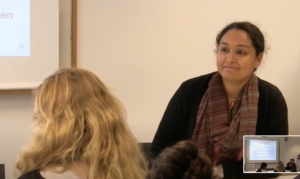 Dr. Rakkee Timothy from the V V Giri National Labour Institute held a SASNET/CMES lecture at Lund University on Thursday 15 March 2016, 15.00–17.00. The seminar, organised in collaboration with the Center of Middle Eastern Studies, at Lund University, was entitled ”Migration of Women Workers from South Asia to the Gulf”. See YouTube recording.
Dr. Rakkee Timothy from the V V Giri National Labour Institute held a SASNET/CMES lecture at Lund University on Thursday 15 March 2016, 15.00–17.00. The seminar, organised in collaboration with the Center of Middle Eastern Studies, at Lund University, was entitled ”Migration of Women Workers from South Asia to the Gulf”. See YouTube recording.
Rakkee Thimothy is an economist by training and a Ph D. from Centre for Economic Studies and Planning (CESP), Jawaharlal Nehru University, New Delhi. She had secured M.Phil in Applied Economics from Centre for Development Studies, Thiruvananthapuram. Her research interests include changing structure of employment generation, linkages between economic growth and employment, labour migration and skill development.